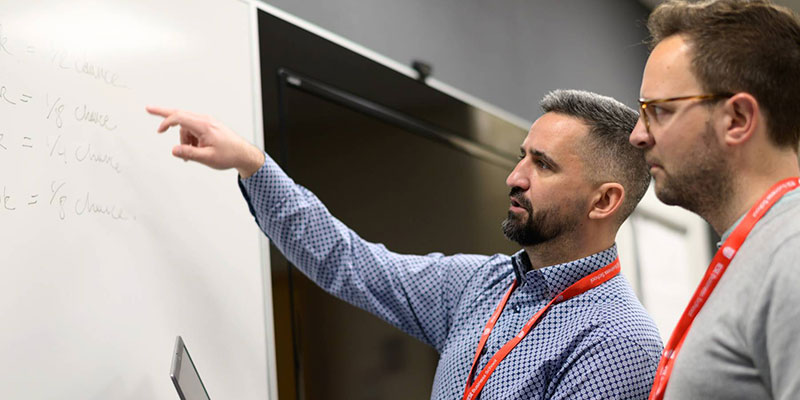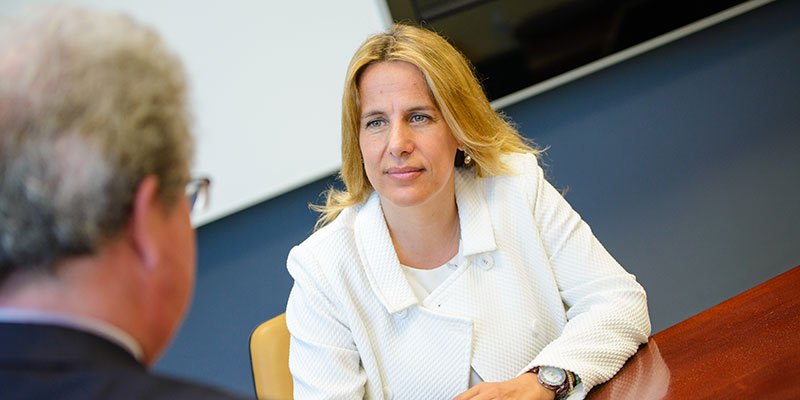Global Executive MBA Open Day
Four pillars. One next-level leader
The Global Executive MBA is the unique MBA experience designed around FOUR KEY PILLARS critical to every successful international leader. If you chose the IESE GEMBA, these pillars will guide your future career to ultimately:
IESE GEMBA. What Will You Learn?
The Global Executive MBA is a unique international experience, taking you to global business hubs in the U.S., Europe and Asia.
The program consists of six core modules, three Foundational and three immersive Discovery modules, along with the option to select two Specialization electives to tailor your learning experience. Its flexible format, which combines residential modules and distance learning, reinforces learning through a stimulating blend of rigorous academic content and experiential and action-oriented learning methodologies.

Phase 1
Foundational Modules (first 6 months)
BARCELONA | MADRID | MUNICH
Your journey starts with the essentials.
These first three modules cover everything from core business fundamentals—such as leadership, finance, accounting, decision-making, and entrepreneurship—to external dynamics like competition, strategy, marketing, and sustainability, as well as how companies operate through business models, operations management, and financing.

Module 1: Laying the Foundations - BARCELONA
Master the essentials. Reflect on what it means to be a leader and start facing managerial decision with higher precision and strength.
Get inspired and learn from Antoni Gaudí’s Sagrada Familia and the local culture.
- Analysis of Business Problems
Facilitates in-depth analysis of complex business problems and decision-making grounded in six clearly defined steps: assessing the problem, defining decision-making criteria, identifying options, analyzing options and, finally, making a decision while weighing potential risks.
Syllabus - Decision Analysis
Deals with decision making under both uncertainty and time effects through some instruments and general frameworks to think about the process of decision-making both based in data as well as acknowledging certain systematic mistakes or psychological biases.
Syllabus - Financial Accounting
Provides the tools to read and interpret core financial statements, and examines the subjective nature of key financials – which are often based on estimates – to help participants develop a critical eye and better evaluate their quality.
Syllabus - Leadership
Harnesses participants’ collective experiences as global managers to challenge existing frameworks and create new models of how to lead people and organizations.
Syllabus - Managerial Communications
Introduces the theory of persuasion in various contexts, including presentations, talks and interpersonal relations.
Syllabus

Module 2: Decoding Business - MADRID
Sharpen your strategic thinking with the right frameworks to navigate today’s AI-driven business landscape.
Experience the unique contrast between cutting-edge companies and timeless art at the iconic Museo del Prado
- Competition and Strategy
Introduces value creation, value capture and sustainability. Examines concepts and models to analyze competitive environments. Evaluates competitive strategies based on cost and differentiation advantages and approaches for breaking into new markets.
Syllabus - The Digital Context
Explores how to anticipate the impact of digital technologies on business models, organizations, and industries and how to drive digital transformation.
Syllabus - Managerial Accounting
Focuses on management of working capital and the underlying operational necessities it generates. In-depth analysis of financial statements through ratios to evaluate overall corporate financial health. Complements financial statements with tools such as cash budgets and provisional financial statements. Presents solutions for financing working capital.
Syllabus - Marketing Management
Analyzes the cornerstones of marketing and sales, including product planning, market selection, distribution, price fixing and promotion. Examines the functional responsibilities of sales managers and interplay with the rest of the management team. Hones the skills, judgment, and values necessary for solid decision-making.
Syllabus
- Sustainability in Business
Explores how companies are adapting to shifting and unprecedented environmental and social challenges and examines the implications for their internal strategies, external positioning, and long-term competitiveness.

Module 3: Improving Business - MUNICH
Step inside organizations to explore how business models evolve — and how operations, finance, ethics, and an entrepreneurial mindset shape their future.
Discover Munich’s vibrant Industry 4.0 scene and the unique culture of Bavaria.
- Business Ethics
Explores the impact of corporate values, culture and ethical system on long-term success. Introduces tools and procedures to prevent and resolve critical issues such as corporate fraud and crime. Examines the pillars of corporate social responsibility and its strategic implementation.
Syllabus - Competing in Business Models
Provides a set of tools that help strategists design robust business models and anticipate actions and reactions of players that participate in the process of value creation and capture: competitors, suppliers, customers, and complementors. Analyzes the drivers of competitive interaction to better anticipate actions and reactions of competitors, customers, suppliers and complementors.
Syllabus - Entrepreneurship
Employs a variety of proven methods and frameworks to allow students to assess their potential as entrepreneurs and intrapreneurs. It also how entrepreneurs generate new market opportunities in both newly established, high-growth companies, as well as consolidated firms. Reflects on the core challenges in the entrepreneurial process.
Syllabus - Industry 4.0
Explores Industry 4.0. and its implications in the manufacturing industry from the perspective of general management. Familiarizes participants with the hardware underlying this revolution, ranging from sensors, robots to factory automation and 3D printing.
Syllabus - Operations Management
Explores strategies to create value and gain competitive advantage by optimizing your business operations. Imparts a global vision for service and industrial operations. Examines the basic variables, concepts, and tools that underpin operations, including process analysis, input/output curves, and line and inventory management.
Syllabus - Operational Finance
Explains economic analysis of operational decisions through differential costs, sensitivity analysis, calculation of indifference curves and break-even points. Examines decisions regarding production, product recalls, department closures, special discounts, acceptance of special orders, manufacturing, subcontracting and decision-making ability. Analyzes cost variance, transfer pricing design and implementation and management incentive systems.
Syllabus
Phase 2
Discovery Modules (At your own pace, 3 modules – 2 weeks each)
NEW YORK | SINGAPORE | SILICON VALLEY
This second phase will take you beyond the basics, encouraging you to expand your horizons, fostering innovative thinking, and challenging you to apply cutting-edge strategies to real-world business scenarios, preparing you to lead with vision and agility.
This discovery phase focuses on topics such as Global Economics, Geopolitics, Cross Cultural leadership, Negotiation, Venture Capital, Getting things done, Critical Leadership or Corporate Finance among others.

Module 4: Managing Value Creation - NEW YORK
Explore New York — a global powerhouse for business, finance, and retail. Dive into the dynamics of the global economy, marketing, and talent challenges in a fast-paced local context.
Experience learning in action with selected visits to leading companies across finance, media, retail or sports and gain unique leadership insights at the iconic West Point Military Academy.
- Global Economics
Develops an analytical framework to better understand the environment in which firms operate. Strengthens economic intuition on issues such as price controls, taxes, unemployment, inflation, currency crises, causes of booms and recessions, including the study how governments affect the economy through its different policies.
Syllabus - Human Resources Management
Analyzes decision making in the context of labor relations and human resources management. Focuses on labor relations management, the relationship between talent management and corporate strategy, and human resources policy and practice, with an emphasis on recruitment and selection, evaluation, professional development and compensation.
Syllabus - Management Control
Examines the broad spectrum of management control problems and the difference between the structure and process of management control. Presents appropriate tools and techniques for successful implementation.
Syllabus - Marketing Planning and Implementation
Analyzes sales management situations, accounting for time distribution, and the requisite human and monetary go-to-market resources. Reviews the core elements of communication policy: mission, market, message, media, budgeting and gauging success. Delves into the sales process and the policies and oversight necessary to manage a sales team.
Syllabus - Negotiation
Offers insights and proven strategies to enhance negotiating skills in a variety of complex scenarios.
Syllabus

Module 5: Leading Across Borders - SINGAPORE
Succeeding as a global leader means navigating cultural diversity, driving collaboration, and adapting across borders.
Set in Singapore — Southeast Asia’s gateway between East and West — this module blends leadership, strategy, finance, and supply chain topics with immersive learning and company visits.
Past experiences have included insights from regional powerhouses like PSA, Shein, BlackRock or OCBC.
- Cross-Cultural Management
Provide focused learning on key cross-cultural issues and to enhance intercultural effectiveness of global business leaders
Syllabus - Emerging Economies
Examines the globalization process and its impact on different economic agents. Studies the role of monetary policy, exchange rates and interest rates in world markets. Analyzes the causes and effects of international trade, and criteria for countries to restrict or regulate international trade.
Syllabus - Supply Chain Management
Considers value chain operations to promote corporate objectives and optimize resources. Examines manufacturing outsourcing, process technology, networks, flexibility, variability control, flow management, decentralized systems, supply chain coordination, service design and operations restructuring.
Syllabus - Global Strategy
Examines the impact of globalization on world markets. Presents a model for analyzing differences between countries, including the CAGE (Cultural, Administrative, Geographic and Economic) distance framework. Presents strategies for maximizing opportunity in a globalized context.
Syllabus - Corporate Finance
Analyzes the structure of company capital, long-term financing possibilities and dividend policies. Reviews the concepts of risk, profitability, diversification, market efficiency and liquidity. Examines the capital asset pricing model to estimate cost of capital and weighted average cost of capital. Assesses the value of projects, assets, and businesses using the discounted cash flow method, multiples, and real options models.
Syllabus

Module 6: Driving Innovation - SILICON VALLEY
Welcome to Silicon Valley — where the future of work, technology, and intelligence comes to life. This highly dynamic module focuses on entrepreneurship, innovation, and digital transformation.
Co-design your learning journey, shaping the industries, companies, and leaders you want to engage with, alongside curated experiences from the program team.
- Design Thinking for Business Innovation:
Focuses on the manager’s and leader’s role as an innovator and facilitator of innovation by others. The course is based on the Silicon Valley-born methodology of Design Thinking, focusing on addressing human-centered problems and turning them into novel solutions.
Syllabus - Managing Digital Transformation
Building upon the digital course in module 2, examines the digital economy in Silicon Valley. Analyzes real-life case studies of industries that have been transformed by Artificial Intelligence, supercomputing and other technological advances and offers insights on evaluating the competitive landscape, challenging incumbents and identifying opportunities for newcomers.
Syllabus - Entrepreneurship: VC and Deals
This course offers a frontline view of how new companies are created in Silicon Valley and the role that venture capitalists play in this process. Real-life examples will shed light on how entrepreneurs and venture capitalist work together in order to create and grow companies.
Syllabus - Getting Things Done
Develop the skills to map out critical stakeholders and identify their needs for successful organizational cooperation, and assess the political landscape of organizations. Analyze strategies to successfully roll-out innovative initiatives given political constraints, and explore how social networks within and outside the firm can be developed and successfully leveraged for work effectiveness and career advancement.
Syllabus - Go Meet the Valley
Do what people in Silicon Valley do.
Syllabus
Phase 3
The Specialization (Electives Modules) – (chose 2 modules – one week each)
For the final 4 months and before graduation, you will have to choose from a list of elective modules to finally customize your learning experience.
Some topics and destinations covered in recent years were*:
- Understanding China and its Opportunities: Shanghai
- Doing Business in Latin America: Sao Paulo
- Entrepreneurial Ecosystems & Innovation: Barcelona
- Future Thinking for a Better World: New York
- Heritage and Innovation for the Future: Tokyo
Exchange Program
In this Specialization phase you will also have the opportunity to be part of an exchange program with our EMBA or the China Europe International Business School (CEIBS) GEMBA and attend a selection of their elective modules taking place in other destinations.
In recent years, some of the options included UK, Ghana, Korea and Japan, India or Praga and Budapest*
* Destinations and options vary from year to year.
Last Phase
Final Week and Graduation
Once you finish all GEMBA elements, you will be eligible to attend the one-week final module taking place in the Summer on our Barcelona Campus. This will be the culmination of a vibrant and unique Journey that you will celebrate with your classmates, faculty and families.
Lifelong Electives. Lifelong GEMBA.
As an alum, you will have the opportunity to rejoin the GEMBA classroom attending these elective modules anytime and as many times as you want.
You will reconnect with the same energy, community, and distinctive learning experiences that made your time with us unique.
Other key program elements
Top international faculty
Next-level leaders demand next-level guidance. The IESE Global Executive MBA faculty are a selection amongst our internationally-renowned professors united by pioneering academic insights and one goal: to help you go global.
IESE’s faculty includes full-time and part-time professors. All full-time professors have PhDs from prestigious universities. They are also highly international, representing more than 20 nationalities, and bring vast relevant expertise from the highest levels of business. Faculty members combine real-world experience with pioneering academic insights.
IESE professors have an “open-door” policy and provide you with invaluable mentoring and guidance. They cultivate rich exchanges of ideas that make the most of the combined experience in your classroom.

The IESE Experience
At IESE, you’ll be surrounded by talented peers, supported by a world-class faculty, and challenged by real-life business cases. We’ll put you to the test so that you can reach your full potential.
Discover the benefits of the IESE experience.
IESE Rankings.











